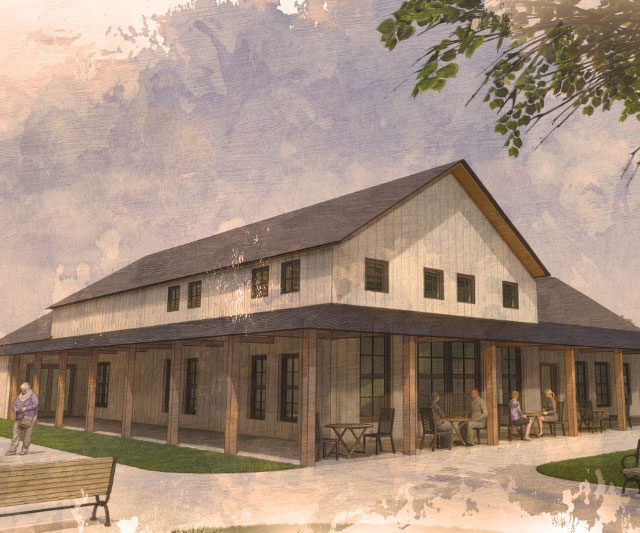As someone who has spent more than 45 years in the senior living industry, it’s been exciting to have been part of the evolution toward better modes of memory care. Working with people with dementia and their families for years has led my team to develop a state-of-the-art road map for the best outcomes in person-centric dementia care.
Based on that roadmap, it only seemed logical to take the institutional model to the next level. United Methodist Communities is creating Avandell, a dementia village, which will be a departure from the traditional environment of dementia care. It’s based on pioneering concepts introduced at De Hogeweyk, a gated model village in Weesp, Netherlands.
A beautiful 18-acre site has been purchased in rural Holmdel, N.J. to construct and operate Avandell. The architectural and program design is complete. However, it will be a few more years before construction can commence due to zoning issues and review by the N.J. Department of Health. Once construction begins, it will be 12 to 14 months before Avandell is ready to welcome its first residents.
This transformational approach to dementia care provides a safe environment where people can live without much change to their regular daily routine.
Of course, space isn’t everything. You can have a marvelous space but offer mediocre care. However, with the right space, you have the freedom to become more people-centric. We want the people we work with, and the people we work for, to live the lives they love. For most people with dementia, a physical setting that resembles a hospital does not work well. It can feel stale and claustrophobic, daunting and cold. The institutional feeling reminds people they are no longer in their homes. It says, “You are not living the life you love anymore — you are somewhere else, somewhere strange.”
Avandell: The rhythm of the day
Avandell will be built as an enclosed village with parks and special nature spaces where residents can experience butterflies, flowers and barn animals. It will have lovely houses, streets, stores and restaurants.
The space is secure, with no access for the residents to leave unattended. However, inside the village, daily life is as normal as possible. That is the goal. People live in their houses, go to the grocery store or post office and have a community space to enjoy hobbies and meet new people — if they want to. The intent is that when a person moves to Avandell, their only major change is their address.
Residents eat together, as friends or families would, in their seven-person houses, managed by a team of staff members. Avandell houses will look exactly like a normal family setting in a neighborhood where people can do what they have always done.
Outside of their houses, Avandell residents will be able to move around freely within the secure, enclosed village square. They are welcome to visit shops, go to the post office, stop by the barn to see the goats and sheep or chat with their neighbors. Such independence notably reduces stress and gives people with dementia special moments again.
Brave new world
A dementia village is a new concept in the United States and is based on De Hogeweyk in the Netherlands. Currently, similar villages are being built in Canada, Australia, Italy and the U.K.
When we went to the Netherlands, we were invited to spend an entire day with the De Hogeweyk team. They were incredibly gracious and generous with their time and knowledge. We had so many questions and they offered some truly fascinating insights into dementia care and what they had learned over the years. Of course, their perspective is a little different from ours because the Netherlands has the benefit of socialized medicine, where taxes supplement the payment for care for its elders and all citizens. Unfortunately, in the U.S., assisted living memory care is, for the most part, private pay.
Avandell’s financial model is predicated on a competitive price-point with other local memory care communities in the marketplace. When Avandell opens, it is expected to cost about $12,000 per month. Ten percent of the residents will receive financial assistance from the State of New Jersey through its Medicaid program. UMC intentionally designed Avandell to be scalable. An Avandell community can be built anywhere there is an age and income-qualified demographic.
It’s tempting to look at the De Hogeweyk dementia village and think, “Build a new physical layout, add some gardens and you’re done.” The truth is that while the physical aspects of Avandell are a major part of its design, the success of the model can only come from the core values that support the initiative. Hence the weaving of our memory care program model plus a village approach = Avandell.
Relaxed care and happiness
Avandell views life as a tapestry — a weaving of all the threads woven together from past events, past relationships and past encounters. For the future of memory care in the United States, this revolutionary life model is the best we have ever seen. When residents and their families interact with Avandell, they will discover an environment that infuses daily living with vitality and purpose.
Our industry had long embraced old and outdated ideas of how residents should live, but we found that offering seniors “nursing homes” and “rest homes” was not enough of the real thing. We have also found those kinds of living situations can disrupt how people with dementia function — which is not surprising considering that people with dementia don’t deal very well with change.
The architects of Avandell understand and respect our inspiration of the village in the Netherlands and how we combine that with the person-centric culture.
The beauty and purpose of nature
In our experience, nature is a powerful force for helping people with dementia find tranquility and familiarity. The lack of nature is one of the great deficiencies of most institutional memory care facilities. This is mostly a problem of structural design. A traditional institution keeps people from really enjoying the outdoors.
Indoor decoration does not provide enough nature and residents deserve to be outside. Indoor potted plants, ceilings painted blue with clouds and faux circa 1950s streetscapes don’t work. People with a dementia diagnosis need to experience the weather: sun, rain and snow.
Our design calls for interactive outdoor spaces featuring a sculpture garden, interesting wind and sound experiences, and a rock and water garden. Another feature will be a greenhouse where residents can grow and pick herbs for their lunch or dinner or visit a unique sensory garden.
A sense of spirituality
We integrate a meaningful sense of spirituality into how we approach our work, stressing compassion, kindness and respect with residents, families and staff. The initiative has evolved, revealing how important it can be for older adults to have the opportunity to engage in religious worship or comparable spiritual practices on site.
For this reason, a planned spiritual space is part of Avandell. We envision the spiritual space as having stained glass windows and a suitable environment for worship services, which are comfortable for observing multiple traditions. The space will accommodate Judaism, Islam and various Christian denominations.
Community resources
I’ve learned that it is a great idea to see how other industries and professional disciplines have solved their biggest challenges. There is so much wisdom and experience in the world, which is exactly what Avandell is helping us incorporate into a fulfilling daily life for its residents.
We find that the change is harder on the family. Residents are so much more resilient than their families believe. Avandell will be connected to support groups and we will suggest referrals to other agencies and information whenever the opportunity arises. We will connect to the Alzheimer’s Association, workshops, family council meetings and care plan meetings.
Realizing the Avandell vision
When you manage a large organization, as I did, you have to come to terms with the reality that at some point after all the talk, all the envisioning and all the thinking, if you want to turn an idea into a reality, you have to take action. This may sound obvious, but I’ve been doing this long enough to understand two often difficult facts about this process. First, sometimes you never actually take action steps. The idea remains an idea, untested and perfect as an unrealized concept. Second, when you do take action, things may not go as you imagined.
To avoid the second difficulty, it is necessary to plan for the operationalization of your idea. Things may not turn out as you were hoping, but the planning process will have done its job and set up the beginnings. Planning is essential and sets the stage for the inevitable changes and challenges that come your way. To take all the ideas we had for Avandell and turn them into an operational reality was a huge challenge. In this endeavor, I had the privilege of tapping into the wisdom and support of a team of trusted experts.
Larry Carlson was the president and CEO of United Methodist Communities, a multi-site provider of senior living in New Jersey for 11 years before his retirement. Larry’s career in senior living spans more than 45 years. He served in leadership roles for six not-for-profit, faith-driven organizations in four states. His book, “Avandell: Reimagining the Dementia Experience,” available on Amazon, is for anyone whose life is impacted by a person with dementia. Avandell embraces people with dementia, allowing them the dignity and joy to live the life they love.







